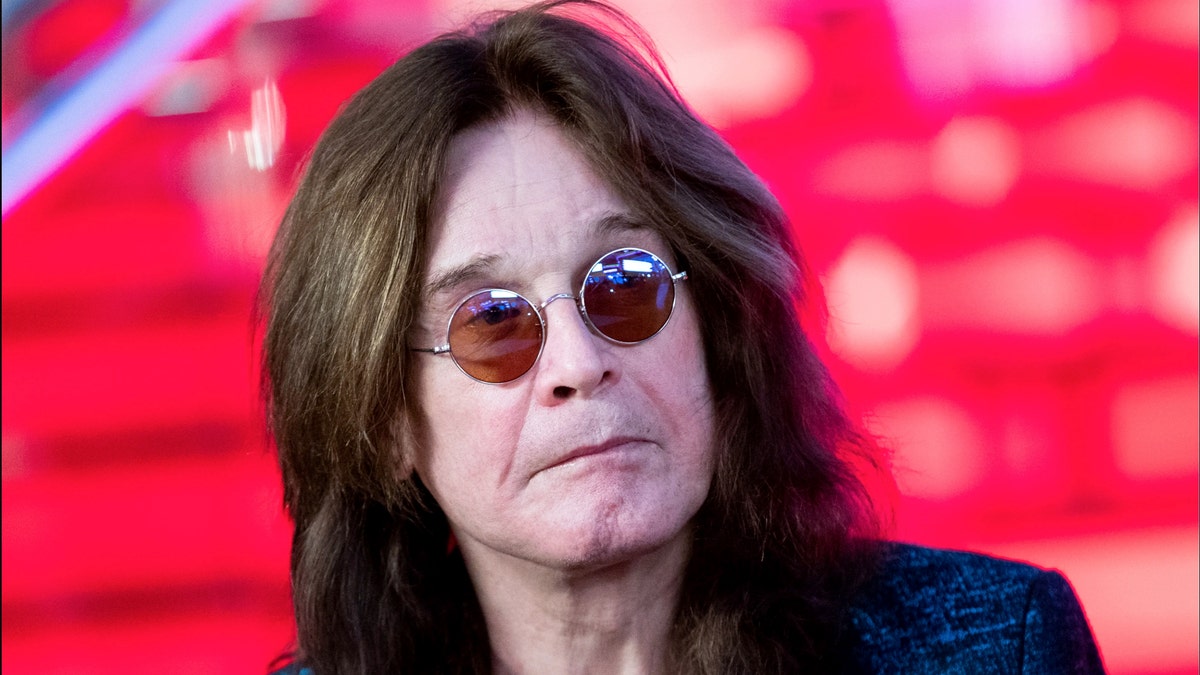NEWYou can now listen to Fox News articles!
Rock legend Ozzy Osbourne died on Tuesday at 76 after battling a rare form of Parkinson’s disease.
The Black Sabbath lead singer had been open about his condition for the last several years, first discussing it during an appearance on ABC’s “Good Morning America” in 2019.
He and wife Sharon Osbourne revealed the rock star’s diagnosis of PRKN-2, a genetic condition typically defined as early-onset Parkinson’s disease that evolves more slowly.
“I’m no good with secrets,” the singer said. “I cannot walk around with it anymore, ’cause it’s like, I’m running out of excuses, you know?”
Osbourne confirmed with GMA that he had a “bad fall” that led to neck surgery and interference with his nerves.

Singer Ozzy Osbourne performs during the NFL game between the Buffalo Bills and the Los Angeles Rams on Sept. 8, 2022, at SoFi Stadium in Inglewood, California. Osbourne died on Tuesday at 76 after battling a rare form of Parkinson’s disease. (Brian Rothmuller/Icon Sportswire via Getty Images)
The rocker took some time off from performing to handle his health complications, but just weeks before his death, he took to the stage one last time for Black Sabbath’s “Back to the Beginning” performance on July 5 in Birmingham, England.
What causes Parkinson’s?
Dr. Brandon Crawford, a developmental functional neurologist in Cedar Park, Texas, and co-founder of the NeuroSolution Center of Austin, noted that Parkinson’s disease can affect everyone differently.
The progressive neurodegenerative disorder impacts the area of the brain called the midbrain, which produces the chemical dopamine.
ROCK LEGEND OZZY OSBOURNE SPENT FINAL DAYS WITH FAMILY IN ENGLAND HOME: REPORT
Dopamine is known for promoting happiness, but it also motivates the body to move and think.
Only about 10% to 15% of Parkinson’s cases are “clearly linked” to genetics, Crawford noted, while the majority is due to a combination of mild genetic susceptibility and environmental triggers.

Parkinson’s is a progressive neurodegenerative disorder that impacts the area of the brain called the midbrain, which produces the neurotransmitter dopamine. (iStock)
“Things like toxins, head trauma, sleep disruption or chronic inflammation tip the balance toward disease,” Crawford, who did not treat Osbourne, told Fox News Digital.
Parkinson’s patients typically notice a physical slowing and inability to move their body. Some will first experience tremors, which Crawford called a “hallmark sign,” often beginning in the hands.
ALZHEIMER’S RISK COULD RISE WITH SPECIFIC SLEEP PATTERN, EXPERTS WARN
The disease can also cause digestive complications, such as constipation, inflamed gut or general intestinal issues. Cognitive decline is also a “major component” in Parkinson’s development, the doctor noted.
“Dopamine travels from the midbrain into the frontal lobe, and it gives us our ability to think,” Crawford said. “It gives us a lot of our executive skills. And so that cognitive ability begins to decline.”

Flowers, notes and floral tributes placed on the Black Sabbath Bridge bench are seen in Birmingham, U.K., on July 24, 2025, in memory of Ozzy Osbourne. (Ioannis Alexopoulos/Anadolu via Getty Images)
Patients may also notice slow sleech and dysregulated moods, often exhibiting signs of depression or general lack of motivation.
“It’s beyond just having tremors or slowed movement,” Crawford said. “This neurodegenerative disease really starts to impact someone’s entire life.”
Disease management
While there is no cure for Parkinson’s, it can be managed with dopamine agonists (medications that mimic dopamine) and other stimulants that can stabilize symptoms for a limited time.
There may be “moments of clarity” and better movement, Crawford said, “but then as those drugs start to wane, everything kind of comes crashing back.”

Ozzy Osbourne and Sharon Osbourne attend the Pre-GRAMMY Gala on January 25, 2020, in Beverly Hills, California. Sharon Osbourne described her husband’s condition during a 2019 interview with GMA, explaining how several good days are followed by “a really bad day.” (Alberto E. Rodriguez/Getty Images for The Recording Academy)
Sharon Osbourne described her husband’s condition during the interview with GMA, explaining how several good days were often followed by “a really bad day.”
In 2024, during an episode of his SiriusXM show “Ozzy Speaks,” with co-host Billy Morrison, the singer shared details about stem cell treatments for his condition, which he’d reportedly been receiving for several years.
MAKING THESE 11 LIFESTYLE CHANGES COULD WARD OFF ALZHEIMER’S, EXPERT SAYS
Kelly Osbourne, Ozzy’s daughter, commented in a 2020 interview with Cells4Life, a U.K.-based stem cell bank, that her father’s progress after just one treatment was “mind-blowing.”
“He wants to get up. He wants to do things. He wants to be a part of the world again,” she said. “He’s walking better. He’s talking better. His symptoms are lessening. He is building the muscle strength back that he needs.”
CLICK HERE TO SIGN UP FOR OUR HEALTH NEWSLETTER
Stem cell therapy for Parkinson’s disease could replace the dopamine neurons lost to degeneration, according to Mass General Brigham.
The hospital system announced FDA approval of a Phase 1 clinical trial for the therapy in March.
Environmental factors
Ozzy Osbourne’s heavy-metal, rock-star lifestyle most likely did not help the development of his condition, according to Crawford.
Circadian disruptions can be a major precursor of Parkinson’s, as staying up late into the night in artificial lighting and eating meals outside of a normal schedule can be detrimental to the brain.

Ozzy Osbourne’s heavy-metal, rock-star lifestyle most likely did not help the development of his condition, according to a doctor. (Getty Images)
“When the sun goes down, our retinas, our brain, our entire biology, is not designed to have this high-frequency light stimulus,” he told Fox News Digital. “Multiple studies show that this type of exposure … can disrupt this circadian biology.”
These factors can also alter the microbiome, gut function, neurotransmitter production, liver function, detox pathways and stem cell migration, and can also promote chronic inflammation, the doctor warned.
For more Health articles, visit www.foxnews.com/health
For someone like Ozzy Osbourne who lived a lifestyle that most likely does not consider “natural rhythms,” there can be a higher risk of other conditions, like Alzheimer’s or heart disease, according to the expert.
Other lifestyle factors that could have led to Osbourne’s Parkinson’s diagnosis include the constant presence of loud music, substance abuse and head-banging, Crawford mentioned.

Ozzy Osbourne performs on stage with Jake E. Lee. Lifestyle factors that could have led to Osbourne’s Parkinson’s diagnosis include the constant presence of loud music, substance abuse and head-banging, a doctor said. (Phil Dent/Redferns; Getty Images)
“That’s going to create some repeated head trauma … if you’re going to be up there constantly shaking this brain in your head that’s literally like a bowl full of jelly,” he said.
CLICK HERE TO GET THE FOX NEWS APP
In addition to loud music, studies have shown that long-term exposure to heavy metals in a rock star’s environment — like mercury, manganese and lead — could lead to an increased risk of Parkinson’s.
“As you’re traveling the world, you’re staying in older venues or using old equipment in a poorly ventilated area,” Crawford said. “All of these things start to add up.”
